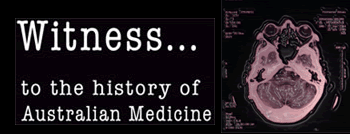


A chapter in the evolution of paediatrics in Australia
Introduction
Participants
Origins of the Department
Early developments
Leadership
New directions in patient care, research and teaching
Ethical issues in research and treatment
Formalising the research effort
Training Programs
Surgical research and training
Finding funds for research
Establishing sub-specialty departments
More on medical education
Academic outreach
Endnotes
Index
Search
Help
Contact us

Peter Phelan: Vernon ran the Department of Paediatrics. When I came to the Hospital, his First Assistant was John Court. They ran a high quality clinical service, and Vernon played a major role in teaching. I don't think this role should be downplayed. Vernon did give strong leadership in teaching. He knew by name every student that came to the Hospital - 40, 50 or 60 students a term.
John Rogers[50] : And actually, Vernon would stand in the corridor and greet you by name as you walked into the Hospital on your first day. He would have studied the student photographs the night before and memorised the names.
Arthur Clark: And he made the rest of us do it too.
Peter Phelan: So the Research Foundation was largely Howard and Charlo [Charlotte Anderson] and latterly John Colebatch, and Durham [Smith][51] worked in the Surgical Research Unit established by Doug Stephens.[52][53] But they had very little formal or informal contact with the University Department. Their interest was in pursuing their field of research and clinical services. The Research Foundation was established in about 1960 but that grew out of Howard's Clinical Research Unit and Dougís Surgical Research Unit. But it [the Research Foundation] was to some extent a bucket of money for these research groups.
Arthur Clark: I think Peter, if I could interrupt you, Vernon actually was very important in getting the research funds going too, within the Hospital.
Bernard Neal: Another point where Vernon Collins was crucially important related back to this payment of medical staff.[54] Until about the time when the people of my generation were coming along, paediatrics was something that the adult specialists did and there were a few people in general practice who were on the staff at the Children's Hospital who seemed to have a good bedside manner with children. Thatís about all it was.
Vernon Collins could see that there had to be properly-trained, full-time paediatricians. And I was lucky enough to be about when there was a little bit of money and Vernon Collins would talk to us individually about the steps we could take to make a career in paediatrics. That was how Alex Venables, Tom Maddison,[55] myself, just a small handful of people, and Vernon would say there's a bit of money for outpatient sessions and various bits and pieces were hung together. And Vernon Collins was pre-eminent in establishing a core of well-trained full-time paediatricians. So he may not have been doing research in the laboratory, but he was very important in putting paediatrics on the map.
Durham Smith: Just a little anecdote. I don't think thereís any doubt about Howard Williamsí desire to become Professor of Child Health. In 1959, Howard and I flew together for 8 hours on a plane trip to the World Congress of Paediatrics. I can remember two things. One was that he was really generous in his comments about Vernon. He made no derogatory comments at all. He was very supportive.
Secondly, he said, if I am appointed, I hope to be able to introduce a research program, and I think he certainly would have given the Chair a stronger research element than it developed under Vernon Collins.
Peter Phelan: Howard was very disappointed at not getting the appointment and there were probably a complex of reasons. He was not a good administrator, could be abrupt with his less competent colleagues and didn't tolerate fools gladly. Vernon was a consummate administrator and diplomat, a visionary who was adept at the politics. Both he and Howard had a broad view of paediatrics. Overall, I think Vernon was the better appointee as Foundation Stevenson Professor although Howard was a better teacher and clinician.
 |
Witness to the History of Australian Medicine |  |
© The University of Melbourne 2005-16
Published by eScholarship Research Centre, using the Web Academic Resource Publisher
http://witness.esrc.unimelb.edu.au/011.html